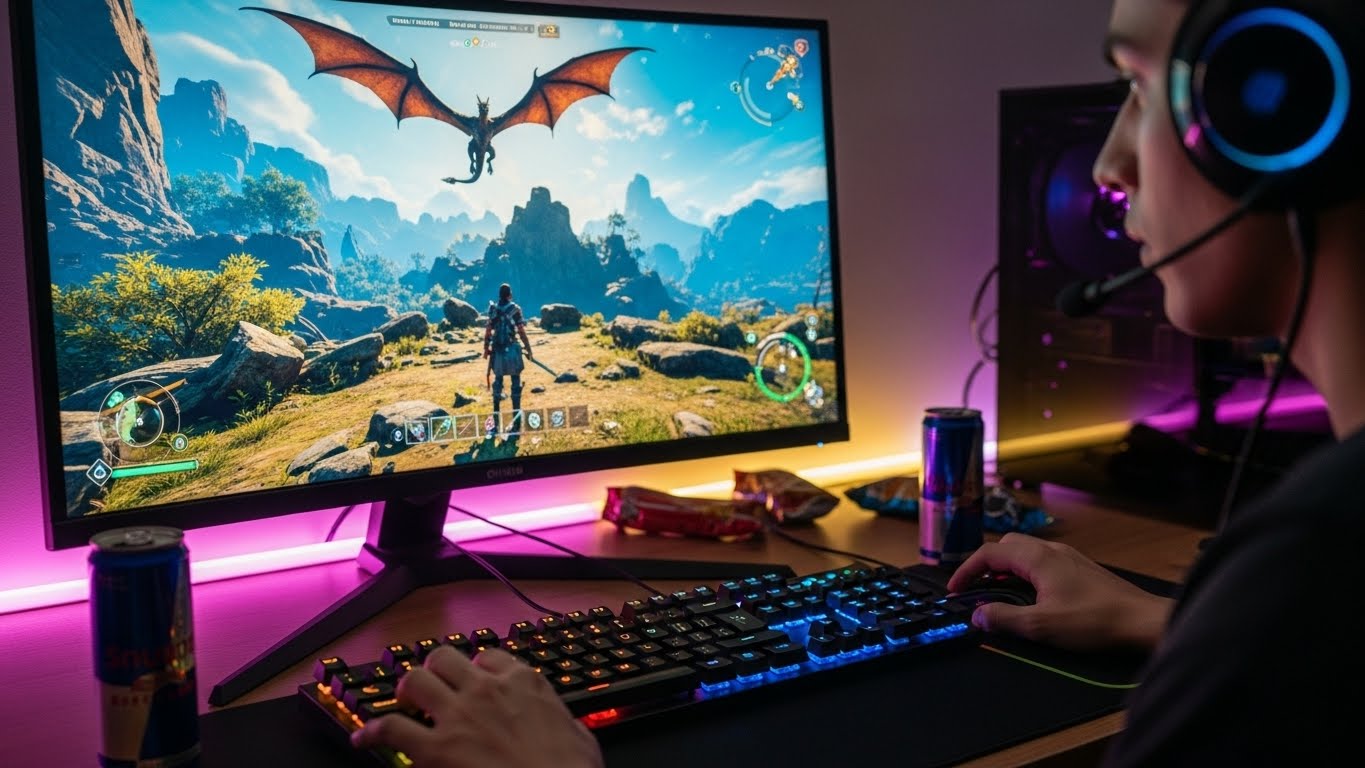Gaming has evolved far beyond the realm of simple entertainment. What began as a pastime enjoyed by a niche group of enthusiasts has now become a global phenomenon, impacting not only technology but culture, education, and social interaction. In this blog post, we will explore the world of gaming in-depth—its evolution, impact, psychology, and where it’s headed in the future.
Introduction to Gaming
Gaming is no longer just an activity; it has become a way of life for millions around the globe. Whether you’re a casual mobile gamer, a competitive esports player, or someone who enjoys immersing themselves in expansive open worlds, gaming has something for everyone. The medium has grown exponentially over the past few decades, and its impact on society is undeniable.
The Universal Appeal of Gaming
One of the key reasons for gaming’s widespread appeal is its ability to bring people together. Gone are the days when games were solitary pursuits. With online multiplayer modes, cross-platform play, and live-streamed gaming events, people from all corners of the globe can connect in ways they never thought possible.
Whether it’s teaming up with a friend to conquer a raid in World of Warcraft or facing off against strangers in Fortnite, gaming offers a unique social experience that transcends geographical boundaries. Moreover, the variety of genres ensures there’s a game for every personality—whether you’re into strategy, action, role-playing, or sports games.
The Evolution of Gaming: From 8-Bit to Virtual Reality
The Early Days: From Pong to the NES
Gaming has come a long way since its humble beginnings. In the 1970s and 1980s, the gaming industry was in its infancy. Games like Pong and Space Invaders introduced the world to interactive entertainment. These early games were simple, consisting mostly of 2D graphics with minimal sound effects, yet they laid the foundation for what was to come.
In 1985, the launch of the Nintendo Entertainment System (NES) revolutionized gaming. The 8-bit console brought us iconic games like Super Mario Bros. and The Legend of Zelda, both of which helped establish gaming as a legitimate form of entertainment. The NES also marked the beginning of a long-standing rivalry between gaming giants Nintendo and Sega, which would define the industry for decades to come.
The Rise of 3D Gaming: PlayStation, N64, and Beyond
In the 1990s, technological advances gave rise to 3D gaming, forever changing how players experienced their virtual worlds. Sony’s PlayStation, released in 1994, introduced gamers to fully immersive 3D environments with titles like Gran Turismo and Final Fantasy VII. Meanwhile, Nintendo’s N64 pushed the boundaries with groundbreaking games like Super Mario 64 and The Legend of Zelda: Ocarina of Time.
These advancements allowed for more complex and detailed worlds, as well as more dynamic and realistic gameplay mechanics. The 3D era also saw the emergence of online multiplayer games, a trend that would grow exponentially in the coming years.
The HD Era: Consoles and High-Definition Graphics
The mid-2000s ushered in the era of high-definition gaming, with the launch of consoles like the Xbox 360 and PlayStation 3. These systems offered graphics that were miles ahead of previous generations, allowing for photorealistic visuals and more immersive experiences. Popular titles such as Halo 3, Grand Theft Auto IV, and The Elder Scrolls V: Skyrim took advantage of the advanced hardware, offering open-world experiences and cinematic storytelling that were previously unimaginable.
Virtual Reality and Beyond: The Future of Gaming
In recent years, virtual reality (VR) has emerged as the next frontier for gaming. Devices like the Oculus Rift, PlayStation VR, and HTC Vive are allowing players to step into their favorite games and interact with them in entirely new ways. VR gaming takes immersion to the next level, offering a truly lifelike experience that has the potential to revolutionize how we engage with games.
Looking further ahead, technologies such as augmented reality (AR), artificial intelligence (AI), and 5G connectivity promise to make gaming even more dynamic and interactive. The future of gaming is likely to be more connected, more immersive, and more interactive than anything we’ve experienced so far.
The Impact of Gaming on Modern Society
Cultural Influence
Gaming has undeniably left its mark on modern culture. With franchises like Minecraft, Fortnite, and League of Legends taking the world by storm, video games have become a global cultural language. Iconic characters like Mario, Sonic, and Master Chief have entered the pantheon of pop culture alongside figures from movies and music. Video game soundtracks, such as those composed for The Legend of Zelda and Final Fantasy, are celebrated and revered in their own right.
Furthermore, video games have inspired movies, television shows, books, and even music. The symbiotic relationship between gaming and other entertainment media has made gaming a cornerstone of modern pop culture. In recent years, video games have even made their way onto the big screen, with movie adaptations of games like Detective Pikachu and The Last of Us bringing gaming stories to a wider audience.
Educational Benefits
While gaming is often viewed as purely recreational, many studies have shown that it can have educational benefits. Games that require strategy, problem-solving, and critical thinking, such as Civilization or Portal, help sharpen cognitive skills. Additionally, certain games promote teamwork and collaboration, teaching players valuable social skills that can be transferred to real-life situations.
Educational games also serve as a tool for teachers. Many educational institutions use games to engage students in subjects like history, mathematics, and science. These games provide a more interactive and enjoyable way to learn, often making complex topics more accessible and engaging.
Social Connections and Communities
Online gaming has given rise to vibrant, diverse communities. Players can come together to share experiences, strategies, and create lasting friendships. Gaming communities on platforms like Discord, Reddit, and Twitch provide spaces for people to connect over shared interests, regardless of their location. These communities are often built around specific games, but they can also form around broader gaming culture and lifestyle.
Esports, in particular, has become a global spectacle, drawing millions of viewers to watch professional gamers compete for prizes. Esports tournaments like The International (Dota 2) and League of Legends Worlds have turned gaming into a spectator sport, with sold-out arenas and multi-million dollar prize pools.
Genres and Platforms in Gaming
Genres: A Game for Every Taste
Gaming offers an incredibly diverse range of genres, each catering to different tastes and preferences. Here’s a breakdown of some of the most popular genres in gaming:
- Action/Adventure: Games like Uncharted and Tomb Raider blend fast-paced action with immersive storytelling.
- Role-Playing Games (RPGs): Games such as The Witcher 3 and Persona 5 allow players to step into the shoes of a character and shape their journey.
- First-Person Shooters (FPS): Titles like Call of Duty and Overwatch put players in the middle of intense, fast-paced gunfights.
- Strategy Games: Games such as StarCraft and Civilization VI challenge players to think critically and plan their moves.
- Simulation Games: The Sims and Animal Crossing provide relaxing, sandbox-style experiences where players can build and manage virtual worlds.
Platforms: From Consoles to Cloud Gaming
Gaming platforms have also evolved over the years. In the early days, players were restricted to arcade machines or consoles like the NES and Sega Genesis. Now, gamers can choose from a variety of platforms, including:
- Consoles: PlayStation, Xbox, and Nintendo Switch continue to be popular choices for gamers, offering a wide array of exclusive titles and high-quality graphics.
- PC Gaming: Personal computers provide the most customizable and powerful gaming experience, with the ability to upgrade hardware and play on ultra settings.
- Mobile Gaming: With the rise of smartphones, mobile gaming has become incredibly popular, offering games like Candy Crush, PUBG Mobile, and Clash Royale.
- Cloud Gaming: Services like Google Stadia, Xbox Cloud Gaming, and Nvidia GeForce Now are pushing the boundaries of how we access and play games, allowing players to stream games directly to their devices without needing high-end hardware.
The Psychological Effects of Gaming
While gaming offers countless benefits, it can also have psychological effects, both positive and negative. On the positive side, gaming can promote cognitive skills, such as problem-solving, multitasking, and spatial awareness. Multiplayer games also encourage teamwork, leadership, and communication.
However, gaming can have downsides if not approached with balance. Excessive gaming has been linked to issues such as social isolation, sleep deprivation, and addiction. It’s important for gamers to maintain a healthy relationship with the



